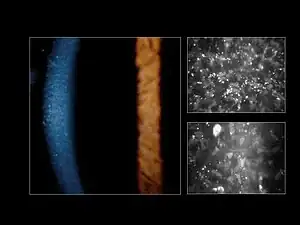Fleck corneal dystrophy
| Fleck corneal dystrophy | |
|---|---|
 | |
| Appearance of the cornea by slit-lamp biomicroscopy (left image) and by confocal microscopy (right image) (Courtesy Dr. Charles N. McGhee) | |
| Specialty | Ophthalmology |
Fleck corneal dystrophy, also known as Francois-Neetens speckled corneal dystrophy, is a rare form of corneal dystrophy. It is caused by mutations in PIKFYVE gene. Small opacities, some of which resemble "flecks", are scattered in the stroma of the patients. Other opacities look more like snowflakes or clouds. The disease is non-progressive and in most cases asymptomatic, with mild photophobia reported by some patients. In a single case report, a corneal transplantation was performed for concurrent keratoconus, and at 10 years follow-up there was still no evidence of the inclusions in the stroma.[1][2]

a) Punctate discrete opacities visible in retroillumination (see arrows) b) discrete punctate grayish-white opacities (see arrows)
References
- ↑ Klintworth GK (2009). "Corneal dystrophies". Orphanet J Rare Dis. 4: 7. doi:10.1186/1750-1172-4-7. PMC 2695576. PMID 19236704.
- ↑ "Cornea and Keratoconus". Archived from the original on 2021-01-27. Retrieved 2021-01-31. Sunday, 31 January 2021
External links
| Classification | |
|---|---|
| External resources |
|
Template:Human corneal dystrophy
This article is issued from Offline. The text is licensed under Creative Commons - Attribution - Sharealike. Additional terms may apply for the media files.